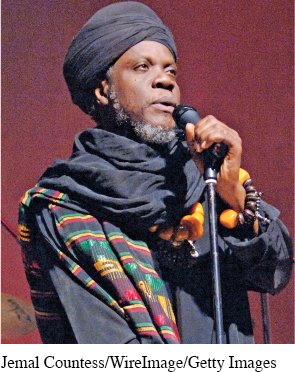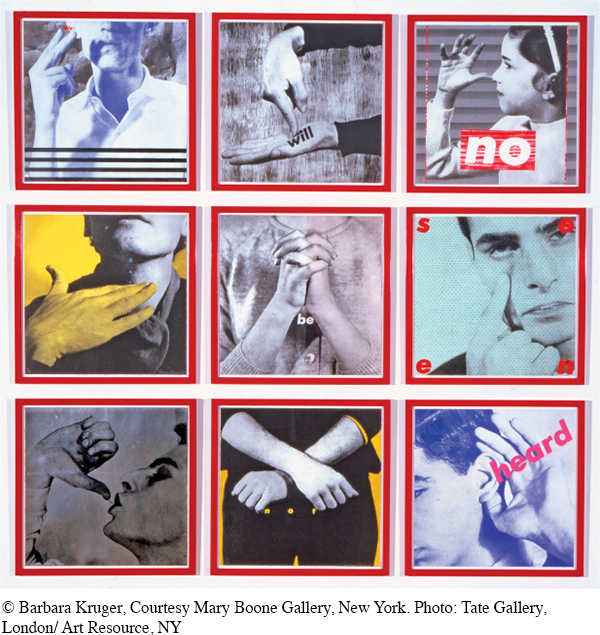9.11
Dis Poem
Mutabaruka

Mutabaruka was born Allan Hope in 1952 in Jamaica, where he went on to attend Kingston Technical High School. Raised Catholic, he converted to Rastafarianism after becoming involved with the Black Awareness movements of the 1970s. He began writing poetry in the 1970s under the name Allan Mutabaruka, then under the single name, which comes from the Rwandan language and translates as “one who is always victorious.” Currently, he lives in Jamaica with his wife and children and frequently travels internationally as a performer and lecturer.
KEY CONTEXT Mutabaruka is a practitioner of dub poetry, a performance genre that began in the Caribbean, incorporating spoken word with reggae music. Unlike the spontaneity and improvisation that characterizes much performance poetry, dub poetry is written ahead of time, usually with a band accompaniment. The two most famous dub poets, Mutabaruka and Linton Kwesi Johnson, typify the political and social consciousness of this genre that carries an overt message, usually controversial, protesting social injustice. In his most recent collection, First Poems/Next Poems (2005), Mutabaruka writes that his poems are intended “to show [readers] the problems that face us in the world and then motivate you to find solutions.” Mutabaruka performed “Dis Poem,” his most widely known work, as part of Def Poetry Jam, a spoken word poetry television series.
dis poem.
shall speak of the wretched sea
that washed ships to these shores
of mothers crying for their young
5 swallowed up by the sea
dis poem shall say nothin new
dis poem shall speak of time
time unlimited
time undefined
10 dis poem shall call names
names like
lumumba
kenyatta
nkrumah
15 hannibal
akenaton
malcolm
garvey
haile selassie1
20 dis poem is vex
about apartheid
racism
fascism
the klu klux klan
25 riots in brixton2
atlanta
jim jones3
dis poem is revoltin against
first world
30 second world
third world
division
manmade decision
dis poem is like all the rest
35 dis poem will not be amongst great literary works
will not be recited by poetry enthusiasts
will not be quoted by politicians
nor men of religion
dis poem is knives . . . bombs . . . guns . . .
40 blazing for freedom
yes dis poem is a drum
ashanti
mau mau
ibo
45 yoruba4
niahbingi5 warriors
uhuru . . . uhuru6
namibia uhuru
uhuru
50 soweto7
uhuru
afrika!
dis poem will not change things
dis poem needs to be changed
55 dis poem is a rebirth of a people
arizin awakin understandin
dis poem speak is speakin have spoken
dis poem shall continue even when poets have stopped writin
dis poem shall survive u me it shall linger in history
60 in your mind
in time forever
dis poem is time only time will tell
dis poem is still not written
dis poem has no poet
65 dis poem is just a part of the story
his-
dis poem is now ringin talkin irritatin
makin u want to stop it
but dis poem will not stop
70 dis poem is long cannot be short
dis poem cannot be tamed cannot be blamed
the story is still not told about dis poem
dis poem is old new
dis poem was copied from the bible your prayer book
75 playboy magazine the n.y. times readers digest
the c.i.a. files the k.g.b. files
dis poem is no secret
dis poem shall be called boring stupid senseless
dis poem is watchin u tryin to make sense from dis poem
80 dis poem is messin up your brains
makin u want to stop listenin to dis poem
but u shall not stop listenin to dis poem
u need to know what will be said next in dis poem
dis poem shall disappoint u
85 because
dis poem is to be continued in your mind in your mind
in your mind your mind


Barbara Kruger, Untitled (We will no longer be seen and not heard), 1985. Lithograph on paper, Tate Gallery, London.
Understanding and Interpreting
What historical events does the poem allude to in the lines, “the wretched sea / that washed ships to these shores” (ll. 2–
3)? The speaker asserts that “dis poem” “will not be recited by poetry enthusiasts” nor “quoted by politicians / nor men of religion” (ll. 36–
38). What is it about the poem that he believes will not appeal to these figures of authority? If that is the case, then, to whom will the poem appeal? What does the speaker mean when he says “dis poem has no poet” (l. 64)?
What kind of authority—
or resistance— does the speaker anticipate when he predicts that readers of the poem will “makin u want to stop it” even though “dis poem will not stop” (ll. 68– 69)? How and why does the speaker believe “dis poem is to be continued in your mind” (l. 86)?
What is Mutabaruka’s overall intention in “Dis Poem”? What is the power of poetry that he invokes as the speaker?
Analyzing Language, Style, and Structure
Who do you think is the audience Mutabaruka intends for this poem? Given the performance aspect, is he only addressing like-
minded people or does he appeal to others outside that circle? To what extent does the use of vernacular enhance the poem only when it is performed? You might want to view a performance online to provide support for your response.
Page 773What effect(s) does Mutabaruka achieve by personifying “dis poem”?
Identify several paradoxes in “Dis Poem.” What do you think is the author’s purpose for including so many?
The tone in “Dis Poem” shifts in different sections. Identify at least two sections with different tones. How do you describe the overall tone?
“Dis Poem” develops as an argument. What is the thesis or primary claim? What evidence does Mutabaruka provide to support it?
Connecting, Arguing, and Extending
Research one of the “names” Mutabaruka lists in lines 12–
19 and explain why that person is a name that “dis poem shall call.” To what extent do you find “Dis Poem” an effective argument? Respond in terms of the written text, the performed text, or a combination.
Why is “dis poem [. . .] a drum” (l. 41)? What is the cultural reference implicit in this metaphor? Research the significance of drumming in Afro-
Caribbean cultures in terms of communication. Do some research into the history and philosophy of dub poetry. Who are its major artists? Is it largely a protest movement? Present your findings in a multimedia format that includes performances.
Write a poem intended to get under the skin of its audience in a way that continues “ringin talkin irritatin” (l. 67) people, that is, a poem that calls its readers to action. Use a vernacular or English dialect in some parts or throughout the poem. Present your poem either as a written or performed text.